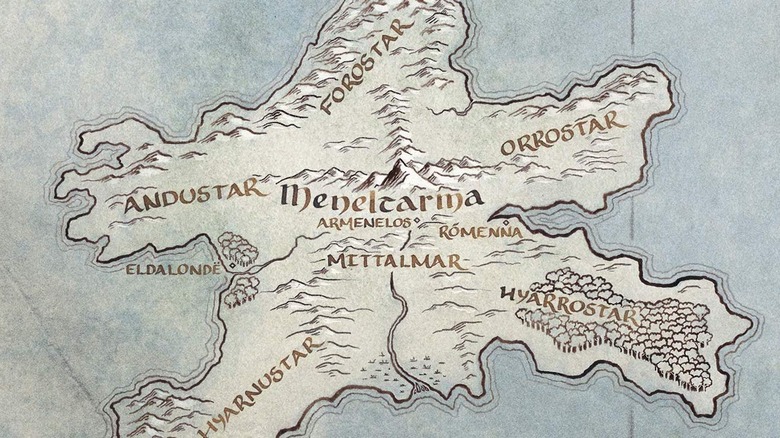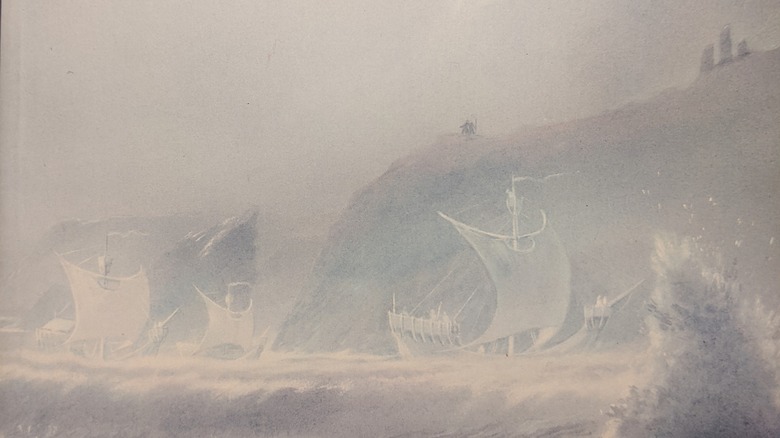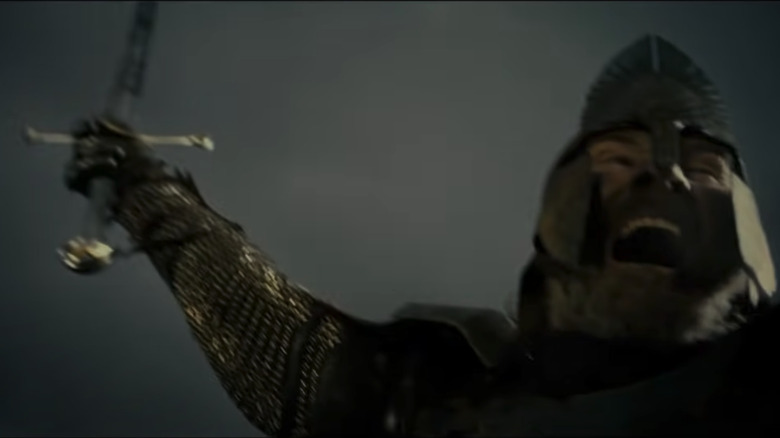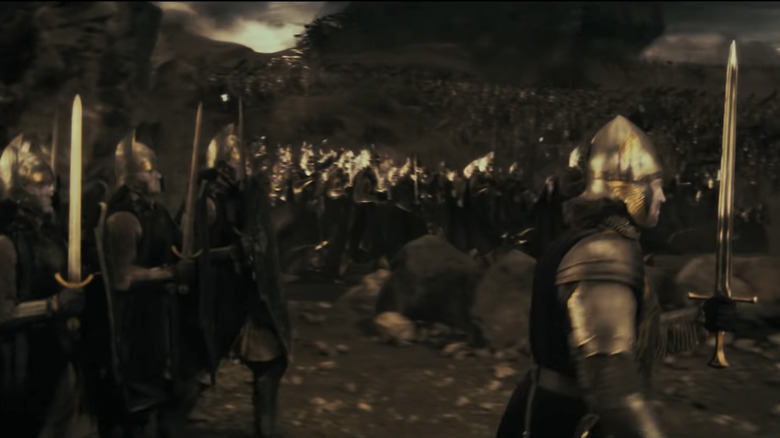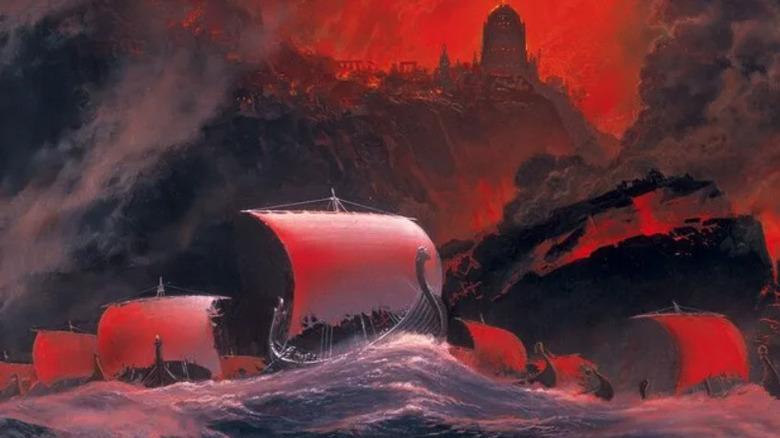J.R.R. Tolkien's Númenor Explained
From the small-town comfort of the Shire to the grandeur of Minas Tirith to the horror of Mordor, there's no lack of compelling geography across the Middle-earth landscape. One name that has been making the rounds in recent years is Númenor. For admirers of Peter Jackson's "Lord of the Rings" films, the word may seem strange and new. For devotees of the printed trilogy penned, it may ring a faint bell.
For those super-fans who have dug further into J.R.R. Tolkien's legendarium, though, the word Númenor is brimming with deeper meaning. It refers to one of the most famous locations in all of Tolkien's world: a nation on an island that has completely vanished from the face of the Earth by the time the War of the Ring rolls around.
While Númenor may not directly impact the "Lord of the Rings" narrative, it certainly has several tangential influences on the story. For instance, Aragorn's ancestors rule the island, and it's directly responsible for the founding of Gondor and its northern counterpart Arnor. The Rangers, the palantíri, and even the Dark Lord Sauron have direct connections to the island nation, too.
On top of that, Amazon Prime Video's foray into Middle-earth is going to center on the Second Age. That means the "Lord of the Rings" TV series will be set thousands of years before the "LotR" trilogy and will focus on a period of time dominated by the Númenóreans.
When you add it all up, between its influence on later stories and its importance during its own era, Númenor is a pretty big deal. Let's dig into the Númenórean narrative a bit more to see what kind of juicy storylines might unfold in Amazon's small-screen adaptation.
Númenor is founded
The story of Númenor starts in the first years of the Second Age. The First Age ends with the epic overthrow of the original Dark Lord Morgoth in the War of Wrath. His downfall leaves room for Sauron to eventually step in as the new Dark Lord. In the meantime, most of the good guys — immortal beings like the god-like Valar, and many of the Elves — withdraw to the Blessed Realm in the West. This is the same place that Frodo and Bilbo sail to at the end of "The Return of the King."
But mortals aren't allowed in the Blessed Realm, and the Men who helped the immortals topple Morgoth are left behind to fend for themselves on the mainland. "The Silmarillion" tells us that, at this point, many areas of Middle-earth become lawless and "the lands were for the most part savage and desolate." It also says that "Men dwelt in darkness and were troubled by many evil things that Morgoth had devised [and] the lot of Men was unhappy."
While the Men may be miserable at first, it turns out that they aren't forgotten after all. The Valar hold a council and decide to create an island between Middle-earth and the Blessed Realm where their mortal allies can live. This beautiful island is called Andor, which means the "Land of Gift." When everything's ready, the Valar calm the oceans and safely lead the Men to their new paradise. "The Silmarillion" tells us that when the Men arrive, they find "a country fair and fruitful, and they were glad." The island is given many different names — including Númenóre, from which we get the name of the nation itself: Númenor.
A long rise to glory
The island realm of Númenor is a fascinating little chapter of Tolkien's mythology. The star-shaped landmass houses a particularly blessed nation of men. "The Silmarillion" explains that for many centuries, they "knew no sickness." Though they're still mortal, "their years were long" and "they grew wise and glorious," like their Elven brethren in the nearby Blessed Realm. Their first king is Elros, the half-elven brother of Elrond. Unlike his sibling, Elros chooses a mortal life, and lives out most of his 500 years as the first king of the island of Númenor. He establishes a royal line that connects to Isildur — and, eventually, to Aragorn himself.
For thousands of years, the realm of Númenor flourishes. Its people live in peace and become great craftsmen and mariners, with their king Aldarion, becoming one of the most famous of them all. They also remain close friends with the Elves, who bring them gifts from the Blessed Realm in the West. One of these gifts is the first of the White Trees, a descendant of which is later seen in the courtyard of Minas Tirith.
But the Númenóreans can't return the favor, as they aren't allowed to visit the Blessed Realm, thanks to something called the "Ban of the Valar." The angelic Valar created this prohibition, blocking mortals from visiting their immortal realm in the west and becoming enamored by the deathless life that they cannot have. For a long time, the Númenóreans are okay with this, and they opt to sail further and further east instead. Here, they explore Middle-earth, where Sauron has been slowly building up power over time. The adventurers take "pity on the forsaken world of Middle-earth" and begin teaching many of the local men various crafts and agricultural skills, comforting them in their misery and helping many of them resist Sauron.
Civil unrest, imperialism, mortality ... and Sauron
Númenor's early days are full of blissful peace, great comfort, and abundant wealth. However, roughly 2,000 years in, things start to get bumpy. The people, especially the kings, begin to crave the immortality that they're denied. This causes them to split into two factions: the King's Men, who cling to life and plot against their Elvish allies, and the Faithful, who hold fast to old alliances.
Naturally, with the kings and their followers leaning toward the disgruntled side, the geopolitical behavior of the nation starts to shift. The Númenóreans start to become more imperialistic, building colonies in Middle-earth, harvesting natural resources, and making the local Men pay them tribute. Nevertheless, Númenor continues to prosper — like, a lot. So much so, in fact, that their wealth and power quietly set the stage for their demise.
See, in spite of their success, the Númenóreans leave one thing out of their calculations: Sauron. The problem isn't that they aren't aware of the Dark Lord. On the contrary, in the middle of the Second Age, Sauron forges the Rings of Power (including the One Ring) and attacks the Elves to claim the other Rings. In that conflict, the Dark Lord nearly wins, but then the Númenóreans arrive in the nick of time and crush his armies. This does two things: It gives Sauron a special grudge against the Men of Númenor, and it gives the Númenóreans a bit of a superiority complex.
Throughout the rest of the age, Sauron begins to tussle with the Men of the West, attacking Númenórean settlements on the coast. Finally, a king named Ar-Pharazôn the Golden takes over, and he hears that Sauron is calling himself the "King of Men." Taking great umbrage at the thought, he sets sail with one goal in mind: subduing the Dark Lord himself.
Sauron comes to Númenor
When Ar-Pharazôn arrives on the mainland with a massive army, it takes all of two seconds for Sauron to see that he can't beat these guys in battle. Instead, the Dark Lord opts for plan B: He actually surrenders himself to the invaders. In "The Silmarillion," it says that Sauron "humbled himself before Ar-Pharazôn and smoothed his tongue; and men wondered, for all that he said seemed fair and wise."
But the King of Númenor knows that Sauron has a reputation for slyness — the scoundrel had already duped the Elven leader Celebrimbor into helping him make the Rings of Power several centuries earlier. So he decides to bring Sauron back to his island for safekeeping. At this point, the Númenóreans seem unstoppable. Their island is overpowered, no one can resist them in Middle-earth, and they even have Sauron safely in custody on their island. Except, yeah, they have Sauron on their island.
And sure enough, it doesn't take long for the silver-tongued villain to talk his way out of captivity and into the trust of the king. Sauron goes from a hated captive to the king's most trusted advisor — and then continues to serve in that role for over half a century. He teaches the king to worship his defeated master, Morgoth, and promises to help him find immortality.
Sauron also uses his new position of power to persecute the Faithful, who find themselves living more and more in the shadows. Additionally, he cuts down the White Tree, a symbol of Númenor's friendship with the West. Fortunately, Isildur heroically saves a fruit of the tree, which later keeps the symbol alive and well. On top of all this, Sauron institutes human sacrifice in bloody worship of Morgoth. As the situation turns from bad to worse, Sauron prepares his final blow against the now-utterly-corrupt king and his crumbling nation.
The downfall of Númenor
For the Men of Númenor, the years during Sauron's time in power are anything but pleasant. Their lifespan shrinks and they are generally unhappy. However, as "The Silmarillion" details, "Nonetheless for long it seemed to the Númenóreans that they prospered, and if they were not increased in happiness, yet they grew more strong, and their rich men ever richer." They also begin to hunt the Men of Middle-earth, enslaving them and sacrificing them. Eventually, the situation is so bad that Tolkien writes that the king becomes the mightiest tyrant "since the reign of Morgoth," adding that "though in truth, Sauron ruled all from behind the throne."
Finally, Sauron makes his biggest move. After several decades, Ar-Pharazôn begins to get old and fearful of his impending death. Sauron convinces him to attack the Blessed Realm, telling him that immortality is being kept from him by the Valar and Elves. Intoxicated with this lie, Ar-Pharazôn builds a massive armada and sails straight to the shores of the Blessed Realm. When he arrives, the disheartened Valar ask Ilúvatar, the Creator of the world, to help them handle the rebellious Men at their doorstep.
Ilúvatar takes over and sinks Ar-Pharazôn, his fleet, and his entire island nation in a catastrophic, world-breaking event. In the process, Númenor ceases to exist. The Blessed Realm is also permanently hidden from the world. The only survivors are a group of ships manned by the Faithful and led by the royal family members Elendil and his sons, Isildur and Anárion. They ride the apocalyptic tidal wave back to Middle-earth, where they set up new kingdoms of their own. The northern one is called Arnor and the southern one is named Gondor — yes, that Gondor. Sauron's spirit survives the disaster, as well, and returns to Mordor, setting the stage for the dramatic Third Age of Middle-earth history that follows.
